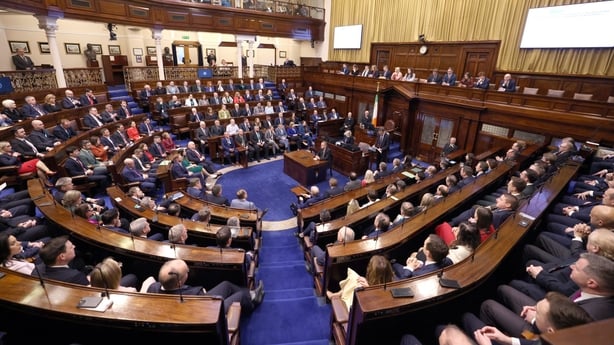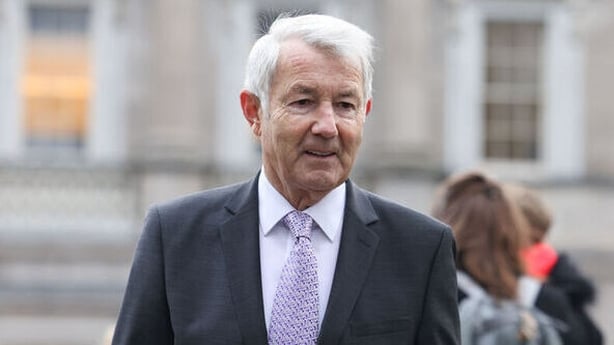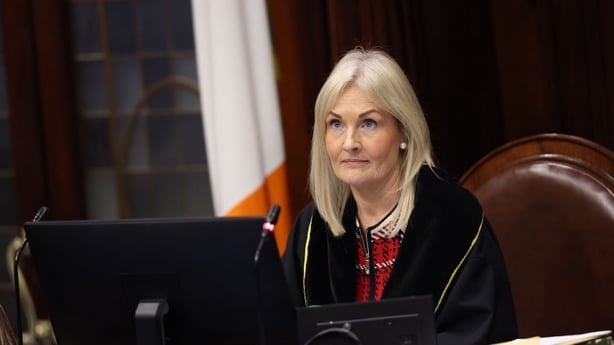Dáil rules - or standing orders - are not something that would usually generate much interest, but conflicting interpretations of the rules are now at the centre of the first major political row of the new Dáil.
Independents who have agreed to support the Government want to form a "technical group" which would afford them speaking time and other rights from the opposition benches.
Opposition parties are furious and there are even accusations of "stroke politics".
So, what is this all about?
What is a technical group?
Under Dáil rules, a number of TDs can band together to get similar speaking time and other rights to what they would if they were in a political party. They are usually members of smaller parties or independents.
Up until 2016 the rules stated that just one "technical group" was permitted, and it had to have a minimum of seven TDs, before gaining recognition in the Dáil.
But that changed after the general election of February 2016 which resulted in a far more fragmented Dáil with many more Independents, smaller parties and alliances.

Following that result, a Dáil reform committee was set up, and it recommended that all parties and groups with five members or more should be entitled to apply for speaking and other rights. And it shouldn't be limited to just one group.
After the rules were changed there were a total of six opposition parties or groupings in that particular Dáil, reflecting the new reality, or what was sometimes dubbed "new politics".
The format of Leaders’ Questions was changed to accommodate four questions instead of three - with the third and fourth questions rotating between smaller groupings and parties.
As well as a slot in Leaders’ Questions, a technical group has the right to priority questions to line ministers. They can also table private members’ motions.
Crucially, the rules state that members must be in opposition to form a technical group.
How many technical groups will this Dáil have?
There will be at least three technical groups in this Dáil.
Although members don’t have to have anything in common ideologically (these groups are merely technical after all) the biggest technical group will be made up of mostly left leaning TDs.
The Independents and Smaller Parties technical group, as it is calling itself, will have eight members including the three PBP-Solidarity TDs - Richard Boyd Barrett, Ruth Coppinger and Paul Murphy.

They will be joined by Tipperary South Independent Seamus Healy, Charles Ward of the 100% Redress party in Donegal, Galway West TD Catherine Connolly, and Laois TD Brian Stanley, who parted ways with Sinn Féin in the run-up to the general election.
The one Green Party TD, Roderic O'Gorman, will also join this group once he relinquishes ministerial duty.
A second technical group will include the four Independent Ireland TDs as well as former Green Party TD and now Independent, Paul Gogarty.
Then there is a third proposed technical group - being led by Tipperary North Independent TD Michael Lowry.
This is the one that is stirring all the controversy.
Who is in it and what’s the problem?
This group is mainly a continuation of the Regional Independent Group of the last Dáil.
The problem is that seven TDs from this group negotiated with Fianna Fáil and Fine Gael to agree a Programme for Government and to support the Government for five years. Those negotiations were led by Deputy Lowry.
It has been proposed that the four members of that group who are due to be appointed to roles as part of their agreement to support the government - two junior ministers and two super junior ministers - would now resign from the Regional Independents Group.
The remainder who will not hold office - including Deputy Lowry as well as Gillian Toole and Barry Heneghan (who were also part of the negotiations to form a Government) would be joined by Danny Healy Rae, Independent Carol Nolan and the two Aontú TDs, Peadar Tóibín and Paul Lawless.
The idea has been strongly opposed across the opposition benches, on the basis that these TDs agreed to support the Government, negotiated the Programme for Government, and therefore cannot be considered opposition TDs.
And remember, the rules or "standing orders" state that a TD must be in opposition to form a technical group.
Many on the opposition say these TDs want all the benefits of being part of government and all the benefits of opposition, having their cake and eating it. They also say that these TDs would be eating into the time of others in opposition in challenging the Government.
But those who want to make up the technical group argue that they are not, strictly speaking, in government because they do not hold a ministerial office. They would point to the last Dáil when some of them supported the government in the majority of votes, but still had a technical group on the opposition benches.
So where does this go from here?
It is really up to the Ceann Comhairle to decide.
Verona Murphy’s handling of this is being watched closely because she was once a member of the Regional independent Group herself, and said in her opening speech as chair that Deputy Lowry proposed the idea of standing for Ceann Comhairle to her in the first place.

She wrote to members of the Dáil’s Business Committee (which is made up of all parties and groups and decides the Dáil schedule) saying her legal advice is that non-party TDs who are not ministers are eligible to be part of a Dáil technical group even if they are backing the Government.
She said there is a longstanding precedent to support this view, and many non-party members have openly supported governments in the past from the opposition benches. She cited the case of Fianna Fáil supporting the Fine Gael government in 2016 and pointed out that Fianna Fáil was still considered the main opposition party at the time.
But this is not being accepted by other members of the Opposition who are determined to resist any moves to allow independent TDs who support the Government to secure more speaking time in the chamber.
Both Sinn Féin and Labour said their legal advice suggests that such a move is not covered by the Dáil's standing orders and must be rejected. They, along with the Social Democrats, People Before Profit and other Independent TDs have come together to make a joint submission to the Ceann Comhairle.
This was presented to Deputy Murphy at a meeting of the Business Committee this morning. She is to consider the submission, and the Dáil schedule allows her to buy some time.
A decision will not be made when the Dáil sits tomorrow to elect a Taoiseach. The would-be technical troupe will sit together in the chamber. But a formal decision will not be made on their future until 5 February - the next Dáil sitting day after that.
This row, it seems, still has some way to run.
Read more:
TDs supporting Govt allowed speak in opposition on temporary basis






